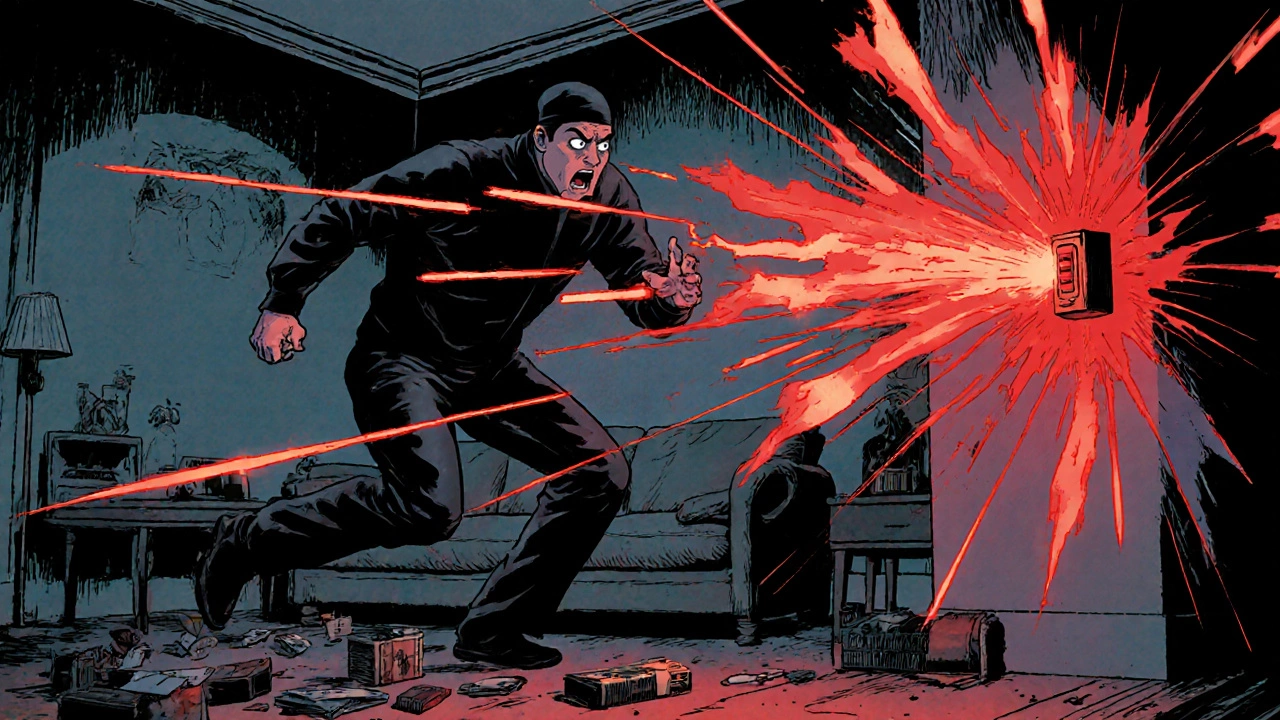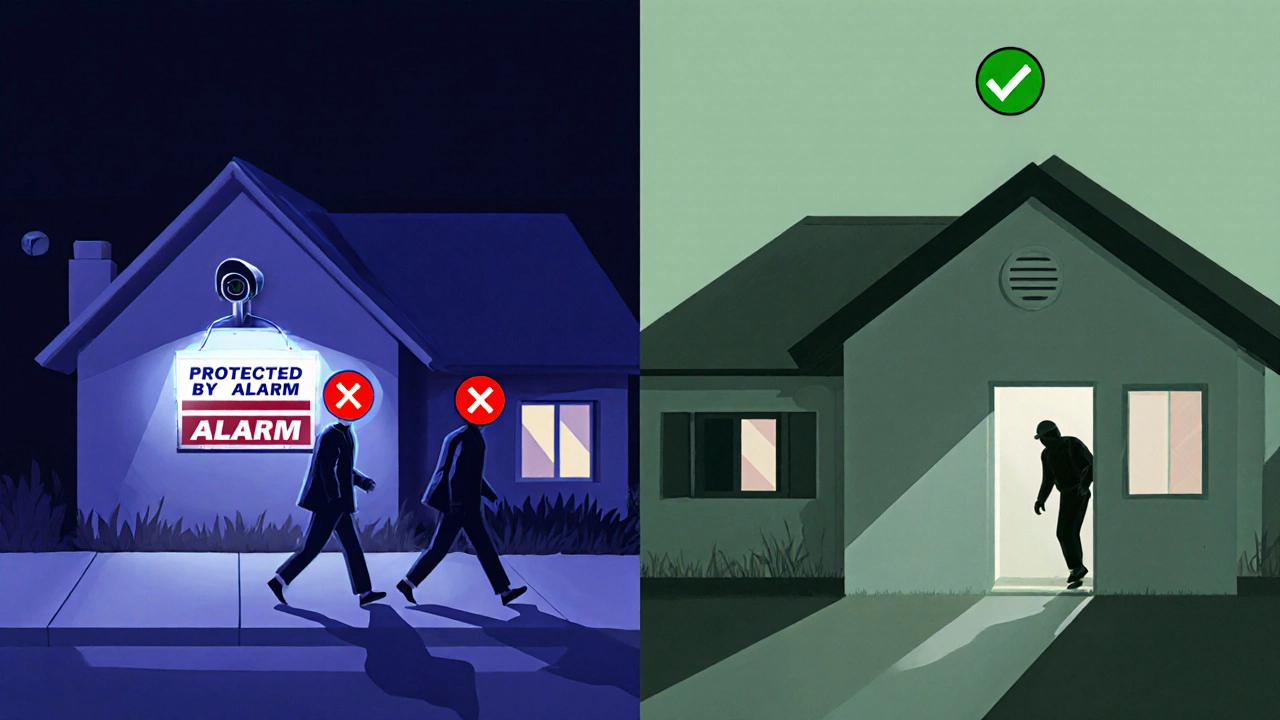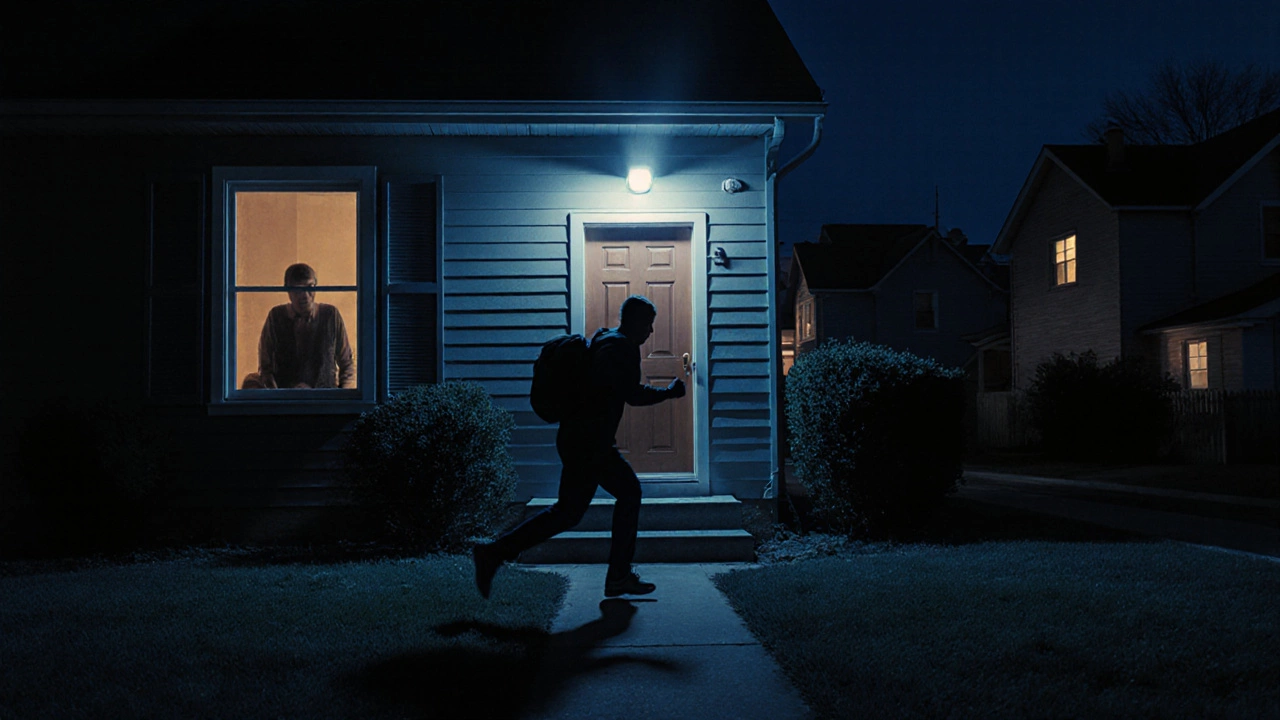Burglar Deterrence Calculator
See how your security choices impact burglary risk based on real data from 400+ convicted burglars.
Your Security Setup
Your Habits
Your Burglar Deterrence Score
This is the percentage of burglars who will leave immediately when your alarm sounds
Your total protection compared to homes with no alarm
Why This Matters
The article states that homes without alarms are 300% more likely to be burglarized. Your score shows how your security choices move you from that high-risk category to a safe one.
Tip: Adding visible security signs alone would boost your protection by 60%—it's one of the most effective deterrents mentioned in the article.
When you hear your home alarm blare in the middle of the night, your first thought isn’t about the noise-it’s about whether the person trying to break in is still inside. The truth? Most of them are already gone. In fact, 87 percent of burglars will abandon their attempt the moment an alarm goes off. That’s not a guess. It’s based on interviews with over 400 convicted burglars conducted by researchers and verified by victim reports across the U.S.
Why Burglars Run When the Alarm Sounds
Burglars aren’t looking for a fight. They’re looking for the easiest, fastest path to cash or valuables. The average residential burglary lasts between 8 and 12 minutes. That’s not enough time to pick locks, crack safes, or haul out heavy items. It’s just enough time to grab what’s easy-jewelry, cash, laptops-and get out before someone notices. An alarm changes everything. That sudden, deafening noise-often 100 to 120 decibels-turns a quiet, low-risk job into a high-stakes gamble. Suddenly, neighbors might look out their windows. A passing car might slow down. Police or private security could be on the way. And in the split second the alarm triggers, the burglar has to decide: risk arrest, or walk away with nothing. Most choose to walk away. A 2013 study analyzed by SafeHome.org found that only 13 percent of burglars would continue breaking in after hearing an alarm. That means nearly nine out of ten gave up right then and there. Why? Because they don’t know if the alarm is real or fake. They don’t know if someone’s home. They don’t know if the cops are already on the way. And they’re not willing to find out.Alarm Signage Works Even Before It Sounds
You don’t even need the alarm to go off for it to stop a burglary. Dr. Joseph Schlesinger of the Alarm Industry Research and Education Foundation found that simply having visible alarm signs on your windows or front door reduces attempted break-ins by 60%. That’s not a minor drop-it’s a massive deterrent. Burglars do reconnaissance. They walk neighborhoods, check for signs of security. A sign that says “Protected by Alarm System” tells them this house isn’t worth the risk. Security company S24 Security tracked 1,200 monitored homes and found that burglars bypassed homes with visible security signage 95% of the time. They didn’t wait to see if the alarm would trigger. They just moved on.Monitored vs. Unmonitored Alarms: What Actually Matters
Not all alarms are created equal. A loud siren on its own can scare off a burglar-but a monitored alarm is even more powerful. Monitored systems connect to a central station that can alert police or private security. When the alarm goes off, someone is watching. And in many cases, responders arrive within 6 to 15 minutes. That’s far faster than police, who average 40 minutes in medium-sized cities. SafeHome.org found that monitored alarms provide 87% protection against break-ins. Even unmonitored alarms still stop 65% of attempts. The difference? Monitored systems add the psychological weight of knowing someone is actively responding. Burglars know that if they’re caught on camera or heard by a dispatcher, they’re not just risking arrest-they’re risking being identified, tracked, and prosecuted.
When Do Burglaries Actually Happen?
Most people assume burglars strike at night. They don’t. According to FBI data, 65% of residential burglaries happen between 10 a.m. and 3 p.m.-when homes are empty, and people are at work or school. That’s why daytime alarm activation matters just as much as nighttime. A motion sensor going off at 11 a.m. while you’re at your job? That’s not a glitch. That’s your alarm doing its job. And if the burglar hears it, they’re already running. Only about one in six burglaries happen at night. And even then, most burglars avoid homes with alarms. One victim told Charleston Security Systems: “The moment our alarm sounded, we heard the intruder crash through the back door and flee within seconds-he left his tools behind.”Why Some Alarms Fail-and How to Avoid It
Alarms aren’t magic. They only work if they’re used right. The FBI found that 63% of alarm-related break-ins happen because the homeowner turned the system off. Maybe they forgot to arm it. Maybe they thought they’d be home for just five minutes. Maybe they got tired of false alarms and disabled the whole thing. That’s the biggest weakness in home security: human error. Other common mistakes:- Installing the system yourself without proper sensor placement
- Not having cellular backup (78% of burglars check for cut phone lines first)
- Skipping visible signs or placing them where they’re hard to see
- Using outdated systems that can be easily jammed or disabled
Smart Alarms Are Changing the Game
Newer alarm systems don’t just make noise-they give you control. In 2024, 67% of new installations included smartphone integration. That means you can:- See live video when the alarm triggers
- Arm or disarm the system from your phone
- Get instant alerts if a door opens while you’re away
- Use AI-powered video verification to reduce false alarms

What About Fake Alarms?
Some people think alarms don’t work because so many are false. But here’s the thing: burglars can’t tell the difference. They don’t know if your alarm is monitored. They don’t know if it’s connected to police. They don’t know if it’s a dummy system. All they know is: it’s loud, it’s sudden, and it means they’ve been spotted. That’s enough to make them leave. Even if your alarm has gone off five times before and no one came, the next time? They won’t take the chance.The Bigger Picture: Alarms Reduce Burglary Rates
Homes without alarms are 300% more likely to be burglarized than homes with them. That’s not a small difference-it’s a game-changer. Neighborhoods with over 50% alarm adoption saw a 22% drop in residential burglaries, according to the National Burglary Prevention Council in 2023. That’s not coincidence. It’s deterrence in action. And as neighborhoods connect through apps like Ring and Nextdoor, the effect grows. When your neighbor’s alarm triggers and they post a video of the suspect, the whole block becomes harder to target. Security expert Dr. Linda Chen predicts this community-based network effect will increase alarm effectiveness by 35% over the next five years.Final Answer: Yes, They Leave-Almost Always
Do burglars leave if the alarm goes off? Yes. Almost always. The data is clear: 87% walk away. 95% avoid homes with visible signs. 63% of break-ins happen because the alarm was turned off-not because it didn’t work. An alarm doesn’t guarantee you’ll never be targeted. But it turns your home from a low-risk target into a high-risk one. And for a burglar, that’s not worth the risk. The best alarm system isn’t the loudest or the most expensive. It’s the one you arm every single time you leave the house.Do burglars really leave when an alarm goes off?
Yes, in the vast majority of cases. Research based on interviews with convicted burglars shows that 87% abandon their attempt as soon as an alarm sounds. The noise increases their perceived risk of getting caught, and most burglars prefer to avoid any situation where they might be seen, heard, or pursued.
Are alarm signs enough to scare off burglars?
Yes. Visible alarm signs reduce attempted break-ins by 60% even before the alarm is triggered. Burglars scout neighborhoods and look for signs of security. A sign telling them your home is protected is often enough to make them move on to an easier target.
Do monitored alarms work better than unmonitored ones?
Yes. Monitored alarms connect to a security center that can dispatch help, making them 87% effective at preventing break-ins. Unmonitored alarms still stop 65% of attempts, but the added risk of immediate response makes monitored systems far more intimidating to burglars.
Why do most burglaries happen during the day?
Because homes are empty. The FBI reports that 65% of residential burglaries occur between 10 a.m. and 3 p.m., when people are at work or school. Burglars avoid nighttime break-ins because they’re riskier-people are home, lights are on, and neighbors are more likely to notice.
What’s the biggest reason alarms fail?
Human error. The FBI found that 63% of alarm-related burglaries happen because the homeowner turned the system off. Whether they forgot to arm it, got tired of false alarms, or thought they’d only be gone for a minute, turning off the alarm removes the protection.
Should I get a smart alarm system?
Yes, especially if you want to reduce false alarms and get real-time alerts. Smart systems with video verification and phone alerts let you confirm what’s happening before calling police. In 2024, 67% of new alarm installations included smartphone integration, and they’ve cut false dispatches by 41%.
Do burglars disable alarms before breaking in?
A small number of experienced burglars carry tools to disable certain types of alarms, but even then, 83% still abandon the attempt rather than risk working under the alarm’s noise. Most burglars aren’t skilled enough to disable systems quickly-and they don’t have time to try.
Is it worth installing an alarm if my neighborhood is safe?
Yes. Burglars target easy opportunities, not high-crime areas. Even in quiet neighborhoods, homes without alarms are 300% more likely to be broken into. An alarm doesn’t just protect against strangers-it deters opportunistic thieves who might be passing through.
What’s the best way to make my alarm more effective?
Install it professionally, place visible signs, use cellular backup, and arm it every time you leave. Combine it with motion-sensor lighting and a smart camera for layered protection. The most effective systems are the ones you never have to think about-because you always arm them.
Do alarms work in rural areas?
Yes, but response times may be slower. Rural areas have lower alarm adoption rates-only 29% compared to 58% in urban coastal areas. Still, the deterrent effect remains strong. Burglars avoid homes with alarms regardless of location. The key is having a system with cellular backup so it works even if phone lines are cut.

